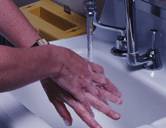
THURSDAY, Sept. 6 (HealthDay News) — Nearly one-third of doctors and nurses are not so thrilled with the idea that hospital patients should be encouraged to remind them to wash their hands before treating them, a new Swiss survey suggests.
The poll was conducted among medical workers at a health center in Geneva, and it also found that very few patients raise the issue with their doctors and nurses, despite rising global concerns about the threat of hospital infections.
“The results were very surprising,” said survey author Dr. Yves Longtin, who conducted the research in 2009 while with the Infection Control Program and World Health Organization Collaborating Centre on Patient Safety at the University of Geneva Hospitals.
“Patients have been encouraged for many years to ask health care workers whether they cleaned their hands before caring for them,” noted Longtin. “This movement has been implemented in numerous countries, including Canada, the U.S., the U.K. and Switzerland. There is no doubt that these campaigns were good-intentioned. However, health care workers’ perceptions regarding these campaigns was little understood.”
Longtin, who is currently an assistant professor and infectious disease microbiologist in the department of microbiology and infectious diseases at Laval University and Centre Hospitalier Universitaire de Quebec in Quebec City, Canada, reports the findings in a research letter published online Sept. 3 in the Archives of Internal Medicine.
In recent years, a rise in the rate of in-hospital antibiotic-resistant infections in the United States and abroad has focused public attention on hospital hygiene. The research team pointed out that good hand hygiene among health care workers is widely thought to be the number one way to curtail such infection risk.
To explore how the patient-caregiver relationship turns on this issue, the team randomly distributed a written survey to 700 nurses and doctors at the University of Geneva Hospitals. About 40 percent (277) responded, with 44 percent of those responses coming from doctors, and 56 percent from nurses.
The authors noted that about two-thirds of those who responded had more than a decade of experience under their belt, and that the hospital had a long history of promoting hand hygiene among its staff.
However, the hospital did not have a specific policy or program in place to promote patient participation on that front, and Longtin’s team found that only 3 percent of the health care workers polled said they had been asked about hand hygiene by a patient in the month leading up to the survey.
Nearly three-quarters of the respondents did say that, generally speaking, more patient involvement might be helpful in reducing the rate of hospital infections.
However, 29 percent did not specifically support the notion that patients remind them to wash their hands, with 27 percent suggesting that it is not the role of a patient to do so, the investigators found.
Why the pushback? About one-quarter said that patient inquiries regarding hand hygiene would take up too much of their time, while 17 percent and 27 percent, respectively, said that such queries would be either upsetting or humiliating.
Between 43 percent and 44 percent of those polled added that they’d feel guilty and/or ashamed to be found out or forced to admit to patients that they had forgotten to wash their hands. About one-quarter said that such an admission would make them appear inept at their jobs, and 18 percent feared legal ramifications.
The poll suggested that such concerns may have implications for hospitals considering new hand hygiene policies, as nearly four in 10 (37 percent) said they would not agree to wear a badge that would specifically solicit patient inquiries on the issue.
“Health care workers have feelings, too, and patients have to be receptive to them,” Longtin noted. “[This] shows that the implementation of a real safety climate will require some change in health care workers’ mentalities in addition to convincing patients that they have a role to play in their care.”
Dr. Philip Tierno, a clinical professor of microbiology and pathology in the department of pathology at NYU Langone Medical Center, sees the issue in black-and-white terms.
“The patient has every right to ask and know if health care workers wash their hands between patients,” Tierno said. “And that is no matter who the person is, whether it is a nurse, a physician or a technician. Because hospital-acquired infections account for about 100,000 deaths in the U.S. alone per year, and 80 percent of all infectious disease is transmitted by either direct contact, such as coughing, talking, sneezing, or indirect contact, such as not washing your hands after touching a bed, a telephone, a doorknob in a patient’s room,” he explained.
“So there are many institutions in the U.S. that have initiated hand-washing programs,” Tierno noted, “and I personally think it’s foolish and myopic for any health care worker to be offended by a patient asking this sort of question. Patients have that right and they are justified in asking.”
More information
For more on hand hygiene, visit the U.S. Centers for Disease Control and Prevention.

